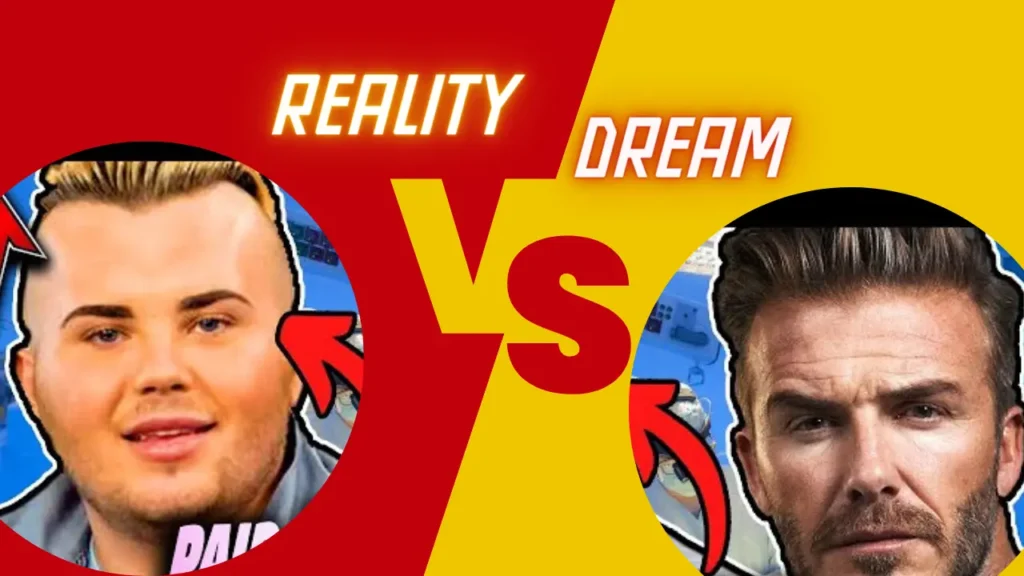Imagine spending your life savings to look like your idol, only to end up in crippling debt and nearly lose everything. That’s the harsh reality Jack Johnson, a 21-year-old from Kimberley, faced after his relentless pursuit to resemble football legend David Beckham.
This story isn’t just about a celebrity obsession gone wrong; it’s a stark reminder of the dangers of body dysmorphia and the pressure to conform to unrealistic beauty standards.
The Price of Looking Like Beckham
Jack’s admiration for Beckham wasn’t just hero worship. It morphed into a consuming desire to physically embody his idol. He sunk a staggering £20,000 into cosmetic procedures – eyebrow lifts, veneers, fillers, Botox – desperate to mirror Beckham’s chiseled features and signature tan.
The financial burden was immense. Jack, a former student at Ellis Guilford School, resorted to loans, dipping into his Disability Living Allowance, and even borrowing from his brother. The emotional toll was even steeper.
“Trying to look like Beckham is a full-time job and is not easy,” Jack confessed to the Daily Mirror. This relentless pursuit pushed him to the brink. “Trying to look like Beckham nearly killed me,” he said, a stark reminder of the desperation his obsession fueled.
The Toll of Body Dysmorphia
Jack’s story isn’t just about the financial consequences of cosmetic procedures. It highlights the devastating impact of body dysmorphia, a mental health condition characterized by a distorted body image and an obsessive focus on perceived flaws.
Jack’s quest to look like Beckham wasn’t driven by a desire for self-improvement; it stemmed from a deep-seated dissatisfaction with his own appearance. This internal struggle, coupled with the pressure to achieve an unattainable ideal, culminated in a suicide attempt four months ago.
Thankfully, Jack was found by a friend and rushed to the hospital. Therapy sessions revealed the underlying body dysmorphia, a crucial step towards recovery.
“I obviously don’t blame David Beckham, it’s not his fault,” Jack clarifies. He recognizes that his obsession stemmed from a personal struggle, not from any fault of his idol.
Finding Himself: A Message of Hope
Thankfully, Jack’s story has a glimmer of hope. He’s receiving treatment, emerging from the darkness, and finally embracing self-acceptance.
“I feel like I’m in the best place ever now,” he shares, a testament to his resilience. His message is clear: “Nobody should ever aspire to look like celebrities to that extent. You need to just be yourself.”
Jack’s brother, Aaron, echoes this sentiment. He acknowledges that Jack “got a bit carried away,” but also highlights the positive trajectory: “He’s coming out the other side, now.”
Beyond Beckham: A Conversation About Body Image
Jack’s story is a cautionary tale, but it also sparks a vital conversation about body image and the influence of celebrities. We live in a world saturated with airbrushed images and unrealistic beauty standards.
Social media and celebrity culture often create distorted perceptions of what constitutes attractiveness. This can be particularly detrimental to young people, who are still developing their self-esteem.
Here are some key takeaways from Jack’s experience:
- Prioritize mental health: If you’re struggling with body image issues, seek professional help. Therapy can equip you with the tools to challenge negative thoughts and cultivate self-acceptance.
- Focus on self-improvement, not imitation: Aim to be the best version of yourself, not a copy of someone else. True beauty comes from inner confidence and self-worth.
- Challenge unrealistic portrayals: Be critical of the images you see online. Recognize the power of photoshop and understand that celebrities often have access to top stylists and cosmetic procedures.
Jack’s story may be a cautionary tale, but it’s ultimately a message of hope and self-discovery. By prioritizing mental health and embracing self-worth, we can all learn to love the skin we’re in.



